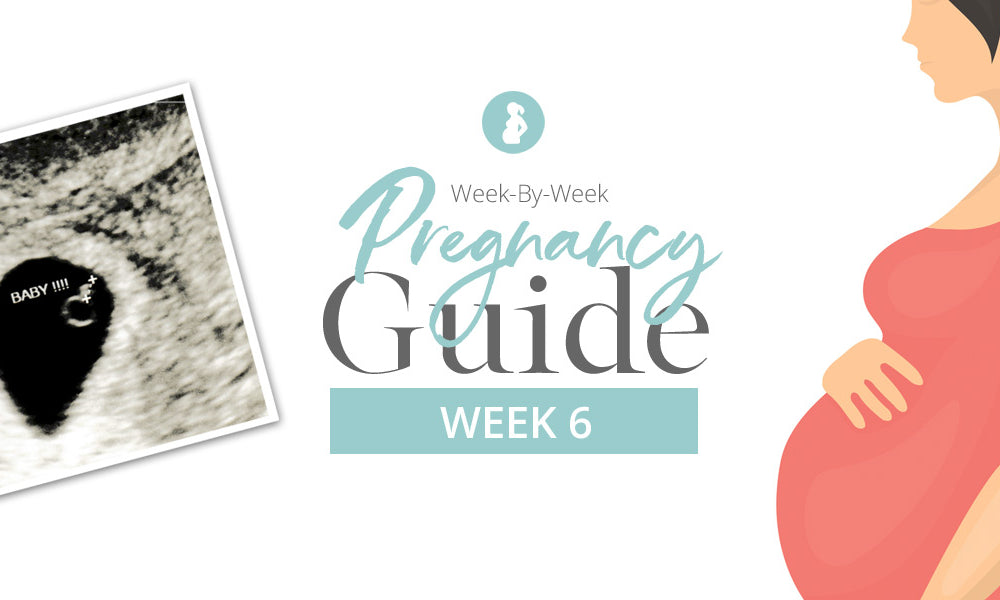6 Weeks Pregnant: Your Weekly Pregnancy Guide

by Jess Wartinger
Oct 20, 2018
Congratulations on your pregnancy! At six weeks pregnant you’re likely still adjusting to the idea that a baby is forming and growing inside of you. If it’s anything like my early pregnancies I have moments when I forget completely when I’m pregnant only to remember with shock (and a swift dose of nausea).
So, how pregnant are you really? What’s happening with your body and your baby this week? Let’s take a look at all aspects of the sixth week of pregnancy.
Pregnancy Week 6 Guide
How pregnancies are dated can be a bit tricky to figure out. While it’s commonly understood that pregnancies last 9 months, the weekly equivalent of a 40-week pregnancy leaves some mathematicians scratching their heads.
Simply put, pregnancies are typically dated from the first day of your last period (LMP). This date may be adjusted if your cycles are irregular or your baby measures five or more days different than expected based on ultrasound. This LMP adjustment is common and has been made for each of my pregnancies.
At six weeks pregnant you’re now in your second month of pregnancy.
How Your Baby is Growing at 6 Weeks
The amount your baby will change this month is astounding. When measured from head to bottom (the way embryos are measured in early pregnancy), your baby is about ¼ inch long. This is equivalent to the size of a lentil, a sweet pea, or a pomegranate seed.

While your baby is still tiny, big changes are happening in development. Your embryo has dark spots where eyes will be, indentations for ears, as well as arm and leg buds forming. He’s developing a jaw, chin, and cheeks. His heart is now beating steadily and the kidneys, liver, and lungs are forming.
6 Weeks Pregnant: How Your Body is Changing
While it’s unlikely you’ve noticed your pregnancy is showing outwardly yet, there’s still a lot happening as you adjust to pregnancy.
Common pregnancy symptoms during week six of pregnancy include:
- Fatigue
- Nausea
- Vomiting
- Headaches
- Frequent urination
- Breast tenderness
Try your best to stay hydrated and continue eating balanced, high-protein meals and snacks. Work to keep the nausea in check by eating frequently and avoid becoming too hungry. Early pregnancy isn’t the time to take on extra tasks so skip unnecessary activities and plan to get to bed early.
Throughout the first days of pregnancy, I find it helpful to stick to my normal breakfasts and morning routines (as much as possible). When my body feels like it’s going haywire, these little things help me to feel grounded and more in control.
I’ve also learned the art of asking for help. The exhausted days of the first trimester are a great time to let others help with tasks around the house. Dishes, laundry, and picking up are all things my family members can take on so I can sit down to rest.
What’s Coming Next?
Big changes are coming in the next weeks. If you haven’t already, this week is a good time to call your doctor and schedule an appointment. Most practitioners will want to see you between 7-9 weeks for an initial ultrasound and appointment.
In the meantime, relax and enjoy (as much as possible) this week of pregnancy.
More Pregnancy Guide Articles
- 6 Weeks Pregnant: Your Weekly Guide
- Pregnancy Week 7: Your Weekly Guide
- 8 Weeks Pregnant: Your Weekly Pregnancy Guide
- Pregnancy Week 9: Your Weekly Pregnancy Guide
- 10 Weeks Pregnant: Your Weekly Pregnancy Guide
- Pregnancy Week 11: Your Weekly Pregnancy Guide
- 12 Weeks Pregnant: Your Weekly Pregnancy Guide
- Pregnancy Week 13: Your Weekly Pregnancy Guide
- 14 Weeks Pregnant: Your Weekly Pregnancy Guide
- Pregnancy Week 15: Your Weekly Pregnancy Guide
- 16 Weeks Pregnant: Your Weekly Pregnancy Guide
- Pregnancy Week 17: Your Weekly Pregnancy Guide
- 18 Weeks Pregnant: Your Weekly Pregnancy Guide
- Pregnancy Week 19: Your Weekly Pregnancy Guide
Jess Wartinger
Jess Wartinger resides in rural New York with her husband and five children. Formerly an early elementary teacher, Jess currently spends her time loving her kids and holding down the fort at home.






